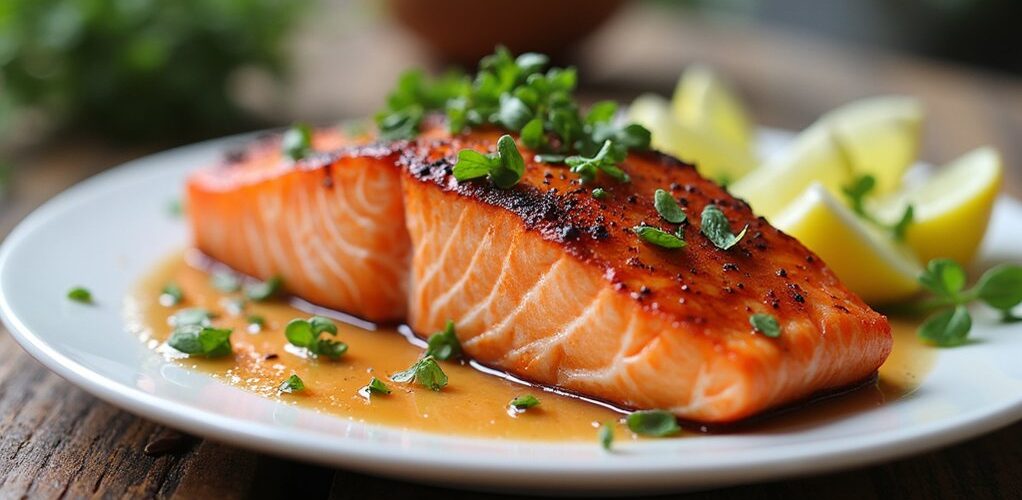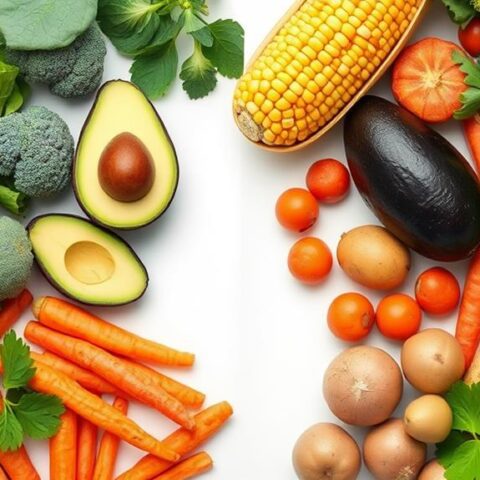
Salmon is a zero-carbohydrate protein source, making it ideal for low-carb and ketogenic diets. A 100-gram serving provides 26 grams of protein and varying amounts of healthy fats, with wild-caught salmon containing 9.2g and farmed salmon 14.5g of fat. Rich in omega-3 fatty acids, salmon supports heart health, reduces inflammation, and enhances cognitive function. While both wild and farmed varieties maintain the zero-carb profile, understanding their distinct nutritional differences reveals their best dietary roles.
Key Takeaways
- Salmon contains zero carbohydrates per 100-gram serving, making it an ideal protein source for low-carb and ketogenic diets.
- Both wild-caught and farmed salmon maintain a zero-carb profile while providing healthy fats and high-quality protein.
- A typical salmon serving offers 26 grams of protein and 11.8 grams of fat, perfect for low-carb meal planning.
- Salmon can be prepared using various carb-free methods like baking, roasting, or poaching while maintaining its nutritional benefits.
- When choosing salmon for low-carb diets, focus on plain fish without added marinades or sauces that might contain hidden carbs.
The Carbohydrate Content of Salmon
The carbohydrate content of salmon stands at precisely zero grams per 100-gram serving, establishing it as an exceptional protein source for those following low-carb dietary protocols. This versatile fish provides substantial nutritional benefits while maintaining zero carbohydrate impact, making it particularly valuable for ketogenic and carb-restricted meal plans. With 26 grams of protein per 100-gram portion, salmon delivers essential nutrients without compromising low-carb dietary goals. Its composition aligns perfectly with nutritional strategies that limit carbohydrate intake to under 50 grams daily. The fish's rich omega-3 fatty acid profile further enhances its appeal, offering cardiovascular benefits and anti-inflammatory properties while maintaining its status as a zero-carb food choice, ideal for those monitoring their carbohydrate consumption. Salmon's high-fat content supports ketosis, a metabolic state where the body efficiently burns fat for energy.
Nutritional Profile of Different Salmon Types
When comparing different types of salmon, wild-caught and farmed varieties exhibit distinct nutritional characteristics, with wild salmon typically containing less total fat but higher concentrations of beneficial omega-3 fatty acids.
The fat content in farmed salmon tends to be higher, averaging 14.5g per 100g compared to wild salmon's 9.2g per 100g, yet both maintain the same zero-carbohydrate profile that makes salmon ideal for low-carb diets.
While both types offer excellent protein content and essential nutrients, wild-caught salmon often provides a more concentrated source of natural omega-3s due to its diet in the wild, compared to the controlled diet of farmed salmon.
Wild Vs Farmed Salmon
Understanding the differences between wild and farmed salmon reveals significant variations in their nutritional profiles, making this knowledge essential for health-conscious consumers.
Wild salmon consistently demonstrates superior nutritional benefits, particularly in omega-3 fatty acids, which contribute to better cardiovascular health.
Key distinctions between wild and farmed salmon include:
- Nutritional Content: Wild salmon contains approximately 25g of protein and 11g of fat per 100g, while farmed varieties typically have higher fat content exceeding 15g.
- Contamination Levels: Wild-caught salmon shows lower levels of PCBs and other toxins compared to farmed alternatives.
- Taste and Texture: Wild salmon offers firmer texture and more robust flavor, attributed to its natural diet and living conditions.
Salmon Fat Content Analysis
Analyzing salmon's fat content reveals significant variations across different species and sources, providing valuable insights for health-conscious consumers seeking ideal nutritional benefits.
Atlantic salmon contains approximately 13g of fat per 100g serving, while sockeye salmon typically features around 10g per 100g, both remaining fatty and high in protein options for ketogenic diets.
The predominant fats in salmon are beneficial omega-3 fatty acids, which contribute to heart and brain health.
Wild-caught varieties generally offer higher concentrations of these essential nutrients compared to farmed alternatives.
This rich fat content not only delivers vital health benefits but also enhances the fish's natural flavor and texture, making it an excellent choice for various low-carb meal preparations.
Health Benefits Beyond Low Carbs
Salmon's health benefits extend far beyond its low-carb profile, with its rich omega-3 fatty acid content providing significant protection against heart disease and inflammation throughout the body. These essential fatty acids, combined with the fish's high-quality protein and B vitamins, enhance brain function and cognitive performance while supporting overall neurological health. The anti-inflammatory properties of salmon help reduce systemic inflammation, which is linked to various chronic diseases and conditions, making it a valuable addition to any health-conscious diet. Additionally, elevated ketone levels are associated with improved memory and cognitive stability, particularly in older adults with mild cognitive impairment.
Omega-3 Heart Protection
While many people focus on salmon's low-carb properties, its heart-protective benefits through omega-3 fatty acids deserve equal attention. Research consistently demonstrates that regular salmon consumption supports cardiovascular wellness through multiple mechanisms, particularly its abundant omega-3 fatty acid content.
The heart-health benefits of salmon's omega-3s include:
- Reduction in blood triglyceride levels, a key factor in cardiovascular disease prevention
- Decrease in blood pressure, contributing to better heart function
- Lower inflammation throughout the body, supporting overall cardiovascular health
To maximize these protective effects, incorporating salmon into meals twice weekly provides ideal omega-3 intake for heart health maintenance.
The EPA and DHA fatty acids found in salmon work synergistically to provide thorough cardiovascular support, making it an excellent choice for those prioritizing heart health.
Brain Function Enhancement
The profound effects of salmon consumption on brain function extend far beyond its low-carb profile, offering significant cognitive benefits through its rich nutrient composition.
The fish's abundant omega-3 fatty acids play an essential role in maintaining brain health, while its vitamin D content supports cognitive performance and mood regulation. Regular salmon consumption helps reduce brain inflammation, contributing to improved mental clarity and potentially decreasing symptoms of depression.
The combination of B vitamins, particularly B12, aids in neurotransmitter synthesis and energy production, essential for peak brain function.
Additionally, salmon's selenium and antioxidants provide crucial protection against oxidative stress, supporting cellular health in the brain. These neuroprotective properties make salmon an excellent dietary choice for maintaining cognitive function and overall mental well-being.
Anti-Inflammatory Powerhouse
Beyond its reputation as a low-carb superfood, salmon stands as a formidable anti-inflammatory powerhouse in the field of nutrition. Its rich omega-3 fatty acid content actively combats inflammation throughout the body while supporting cardiovascular health through reduced triglyceride levels and improved blood pressure regulation.
The anti-inflammatory properties of salmon extend beyond basic nutrition, offering multiple health benefits:
- Promotes muscle repair and growth while managing inflammation-related weight gain through high-quality protein content.
- Enhances immune function through vitamin D, which helps reduce inflammatory markers in the body.
- Supports energy metabolism with essential B vitamins that contribute to the body's natural anti-inflammatory processes.
These combined benefits make salmon an exceptional choice for those seeking to reduce systemic inflammation through dietary choices.
Choosing Between Wild-Caught and Farmed Salmon
Making an informed choice between wild-caught and farmed salmon involves considering several key factors that affect both nutritional value and environmental impact. Wild-caught salmon offers superior health benefits, with a natural diet resulting in ideal omega-3 to omega-6 ratios and higher concentrations of essential nutrients like vitamin D. Its firmer texture and richer flavor profile often make it a preferred choice among discerning consumers.
| Characteristic | Wild-Caught | Farmed |
|---|---|---|
| Diet | Natural marine organisms | Processed feed with additives |
| Texture | Firm | Soft |
| Nutrient Profile | Higher omega-3s, vitamin D | Higher in total fat |
| Environmental Impact | More sustainable | Potential pollution issues |
| Cost | Generally higher | More affordable |
Best Cooking Methods for Maintaining Nutrition
Selecting the right cooking method for salmon plays an essential role in preserving its rich nutritional profile, particularly its valuable omega-3 fatty acids and protein content. Several cooking methods effectively maintain salmon's nutritional benefits while enhancing its natural flavors.
The most effective cooking methods for preserving salmon's nutrients include:
Preparing salmon with the right cooking technique ensures maximum nutritional benefits while creating flavorful, healthy meals for your table.
- Baking or roasting at moderate temperatures, which helps retain omega-3 fatty acids while requiring minimal added fats.
- Poaching in water or broth, which keeps the fish moist and preserves nutrients without additional calories.
- Air frying, which delivers a crispy texture while using less oil than traditional frying methods.
These preparation techniques guarantee that salmon maintains its status as a nutrient-dense food while providing various options for creating delicious, health-conscious meals.
Pairing Salmon With Other Low Carb Foods
When crafting a low-carb meal featuring salmon, thoughtful food pairings can maximize both nutritional benefits and flavor satisfaction.
Since salmon naturally contains zero carbohydrates while being rich in protein and healthy fats, it provides an excellent foundation for a low-carb dining experience.
Incorporating leafy greens like spinach or kale adds essential nutrients without significant carbohydrates, while creamy avocado contributes heart-healthy fats with minimal carb content.
To enhance flavor and texture, low-carb cheese options such as feta or cheddar can be added to create satisfying combinations.
For additional crunch and nutritional variety, a sprinkle of nuts or seeds complements the salmon perfectly while maintaining the meal's low-carb profile.
These thoughtful pairings create well-rounded dishes that satisfy both nutritional needs and culinary preferences. For an extra boost of flavor and nutrition, consider using olive oil and avocado oil as dressings or cooking bases, as they are rich in monounsaturated fats beneficial for heart health.
The Role of Salmon in Ketogenic Diets
Salmon's zero-carb profile makes it an excellent foundation for ketogenic meal planning, while its substantial protein content of 26g per 100g serving supports muscle maintenance during ketosis. The fish's rich omega-3 fatty acids and 11.8g of fat per serving align perfectly with keto requirements, promoting both heart health and the high-fat intake necessary for maintaining ketosis. Regular incorporation of salmon into keto meals, through methods like baking, grilling, or pan-searing, provides a versatile and nutritious way to meet daily macronutrient targets while supporting overall health goals. Additionally, incorporating salmon into the ketogenic diet can improve insulin sensitivity and help manage blood sugar levels, making it a valuable component for those managing type 2 diabetes.
Carb Content Analysis
A thorough carb content analysis reveals salmon as one of the most ketogenic-friendly protein sources available, containing zero grams of carbohydrates per 100-gram serving.
This nutritional profile makes salmon an excellent choice for those following a low-carb diet, while being rich in omega-3 fatty acids that support overall health.
When analyzing salmon's carbohydrate content, three key factors stand out:
- Zero net carbs per serving, making it ideal for strict ketogenic requirements
- High protein density at 26 grams per 100-gram portion, supporting muscle maintenance
- Significant healthy fat content that aligns with low-carb dietary goals
This carbohydrate-free profile, combined with salmon's nutrient density, positions it as a superior choice for those monitoring their carb intake while seeking nutritional benefits.
Health Benefits Overview
Integrating salmon into a ketogenic diet reveals numerous health benefits that extend far beyond its zero-carb profile.
With its high protein content of 26g per 100g serving, salmon effectively supports muscle maintenance while promoting satiety, making it easier to adhere to a low-carb lifestyle.
The omega-3 fatty acids found in salmon play an essential role in maintaining metabolic health by helping to lower insulin levels, which is vital for sustaining ketosis.
Additionally, these beneficial fats contribute to cardiovascular wellness by reducing triglycerides and inflammation.
Regular consumption of this nutrient-dense fish has been linked to enhanced brain function and a decreased risk of chronic diseases, making it an excellent choice for those following a ketogenic eating plan.
Keto Meal Planning Tips
When planning ketogenic meals, incorporating salmon proves to be a strategic choice due to its perfect macronutrient profile of zero carbohydrates, ample protein, and healthy fats.
As a versatile protein source, salmon supports the metabolic requirements of a keto diet while promoting satiety and stable blood sugar levels.
For those looking to include salmon in their ketogenic meal plans, here are effective preparation methods:
- Pan-sear salmon fillets in healthy fats and serve with cauliflower rice
- Create a keto-friendly salmon salad with avocado, olive oil, and leafy greens
- Prepare blackened salmon with a sugar-free spice rub alongside roasted low-carb vegetables
The omega-3 fatty acids in salmon enhance the diet's effectiveness by supporting insulin regulation and fat metabolism, making it an ideal choice for keto practitioners.
Omega-3 Fatty Acids and Their Importance
The remarkable omega-3 fatty acids found abundantly in salmon represent essential nutrients that human bodies cannot produce independently, making them vital components of a healthy diet. While salmon fits perfectly into a low-carbohydrate diet, its omega-3 content offers benefits far beyond macronutrient considerations. These essential fats contribute considerably to cardiovascular health by reducing triglyceride levels and supporting heart function. The impact of omega-3 fatty acids extends to brain health and cognitive function, potentially offering protection against neurodegenerative conditions. Their anti-inflammatory properties make them valuable for managing various inflammatory conditions. Health experts recommend consuming omega-3-rich foods like salmon regularly to achieve the suggested daily intake of 250-500 mg of combined EPA and DHA, ensuring ideal health benefits across multiple body systems. Additionally, the keto diet can significantly enhance cardiovascular health by increasing HDL cholesterol and lowering triglycerides, offering a complementary approach to the benefits of omega-3s.
Meal Planning With Salmon
Successfully planning meals around salmon offers numerous advantages for those following a low-carb eating plan, particularly due to its zero-carbohydrate content and rich nutritional profile.
As a versatile protein source, salmon can be incorporated into various meal combinations while maintaining ketogenic guidelines.
Creating an effective meal plan with salmon involves understanding its nutritional benefits and cooking versatility:
- Pair salmon with low-carb vegetables like spinach, broccoli, or cauliflower to create balanced, nutrient-dense meals.
- Prepare larger portions for multiple meals, utilizing different cooking methods to maintain variety.
- Incorporate salmon into both lunch and dinner options, capitalizing on its 26g of protein per serving to support muscle maintenance.
Salmon is recommended as part of a ketogenic diet due to its high protein content and the added B vitamins, potassium, and selenium that support brain health and the prevention of chronic diseases.
This approach guarantees sustainable adherence to low-carb dietary goals while maximizing the health benefits of this nutrient-rich fish.
Storage and Preparation Tips
Proper storage and preparation techniques play a crucial role in maximizing salmon's nutritional benefits while maintaining its low-carb status. Fresh salmon can be refrigerated for up to two days, while properly wrapped frozen salmon offers extended storage options for meal planning convenience.
When preparing salmon for cooking, allow it to reach room temperature for 15-20 minutes to guarantee even cooking throughout. The fish can be customized with various herbs and spices without adding carbohydrates, and cooking methods such as baking, grilling, or pan-searing are all suitable options.
For food safety, cook salmon to an internal temperature of 145°F (63°C). Any leftover cooked salmon should be stored in an airtight container and consumed within three days, making it an excellent protein choice for weekly meal preparation.
Understanding Salmon Labels and Markets
Steering through salmon labels and markets requires careful attention to detail for consumers seeking the most nutritious low-carb options. When shopping for salmon, a good source of protein and healthy fats, understanding product labels helps guarantee the best quality and value.
- Look for "wild-caught" designations, which typically indicate better nutritional content and fewer contaminants.
- Check for sustainability certifications like MSC to support responsible fishing practices.
- Examine packaging dates and forms (fresh, frozen, or canned) to match preparation needs.
Shoppers should assess fresh salmon's appearance for brightness and moisture while avoiding strong fishy odors.
For canned varieties, choose options packed in water or olive oil without added sugars.
Market availability and prices fluctuate seasonally, making local seafood suppliers valuable resources for quality salmon.
Additionally, those following a keto diet should be mindful of dairy options to avoid that are high in sugars and carbs, as these could disrupt ketosis.
Common Myths About Salmon and Carbs
Despite the wealth of information available about salmon's nutritional benefits, several persistent myths continue to circulate regarding its carbohydrate content and role in low-carb diets.
One common misconception is that all seafood, including salmon, contains significant carbohydrates. In reality, salmon contains zero carbohydrates, making it a perfect choice for those following ketogenic or other low-carb eating plans.
Contrary to popular belief, salmon contains absolutely no carbohydrates, making it an ideal protein choice for low-carb and keto diets.
Another widespread myth suggests that prepared salmon dishes must be high in carbs. While some recipes may add carbohydrate-rich ingredients, the fish itself remains carb-free. Understanding this distinction helps individuals make informed choices when preparing salmon-based meals.
With 26 grams of protein and 11.8 grams of fat per 100-gram serving, salmon provides excellent nutritional value while maintaining strict low-carb requirements.
Weekly Meal Ideas Using Salmon
Creating a weekly meal plan with salmon offers numerous opportunities to maintain a low-carb lifestyle while enjoying diverse and flavorful dishes. Incorporating this versatile fish into different meals throughout the week guarantees proper nutrition while keeping carbohydrate intake minimal.
Consider these practical low-carb salmon meal ideas:
- Start mornings with a protein-rich breakfast of salmon, avocado, and cucumber salad.
- Enjoy blackened roast salmon with mango salsa for a satisfying lunch option.
- Prepare baked salmon with steamed broccoli or sautéed spinach for dinner.
These meal suggestions demonstrate how salmon can be transformed into various dishes that maintain ketogenic requirements while providing essential nutrients. The combination of healthy fats and protein makes salmon an excellent choice for those following a low-carb eating plan, offering both versatility and nutritional benefits. Additionally, salmon consumption can help improve insulin sensitivity, which is a critical factor in managing Type 2 diabetes effectively.
Frequently Asked Questions
Can I Eat Salmon on a Low Carb Diet?
Salmon nutrition perfectly aligns with low carb diets, containing zero carbohydrates per serving. Its protein content and healthy fats provide significant low carb benefits while supporting muscle maintenance and overall health.
What Fish Is Best for Low Carbs?
Tuna offers exceptional benefits with zero carbs and high protein. Salmon, mackerel, and cod provide excellent nutrition while containing virtually no carbohydrates, making them ideal choices for low-carb dietary plans.
Is Salmon High in Carbs?
Salmon nutrition indicates zero carb content per 100g serving. The fish contains no carbohydrates, making it an ideal protein source for those monitoring their carb intake or following low-carb diets.
Is Salmon Healthy Yes or No?
Salmon nutrition research confirms it is exceptionally healthy, offering significant health benefits through omega-3 fatty acids, high-quality protein, essential vitamins, and minerals that support heart, brain, and overall wellness.
Conclusion
Salmon stands as an excellent choice for those following a low-carb diet, containing virtually zero carbohydrates while offering abundant protein and healthy fats. Whether wild-caught or farmed, this versatile fish provides essential omega-3 fatty acids, vitamins, and minerals that support overall health. By understanding proper selection, preparation, and cooking methods, consumers can maximize salmon's nutritional benefits while maintaining their low-carb lifestyle goals through regular consumption of this nutrient-dense food.








No Comments